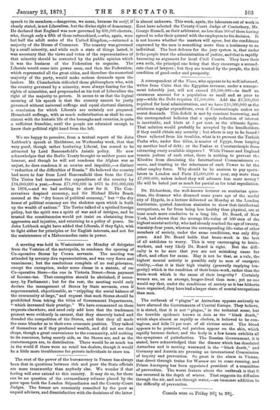A correspondent of the Times, who appears to be well
informed, writes from Cairo that the Egyptian revenue, under a manage- ment tolerably just, will not exceed £8,500,000—in itself an enormous amount for a population so small and so poor to pay—while the Debt requires £7,500,000. Add the £3,500,000 required for local administration, and we have £10,500,000 as the minimum regular expenditure, even if Constantinople makes no secret demands. This deficit is met by constant borrowing, and the correspondent believes that a speedy reduction of interest is inevitable, and hints at 3 per cent, as the ultimate figure. That solution would probably be accepted by the bondholders. if they could obtain any security ; but where is any to be found ? Once relieved from his troubles, what is to prevent the Turkish Pasha who, under fine titles, is master of Egypt, from heaping up another load of debt ; or the Pashas at Constantinople from extracting every available sixpence ? While France and England remain jealous of each other, there is nothing to prevent tlys Khedive from dismissing the International Commissioners en masse, and trusting to the reluctance of each Power to let the other employ force. Why should he be anxious to pay specu- lators in London and Paris £3,000,000 a year, any more than £7,000,000, unless indeed they will advance him more money ? He will be hated just as much for partial as for total repudiation.


































 Previous page
Previous page